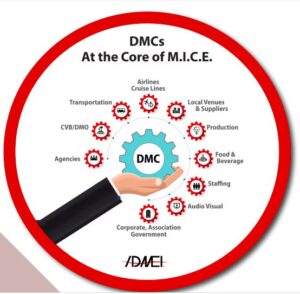Editor’s note: While much of the world was locked down over the past year, members of ADMEI (Association of Destination Management Executives International) have been busy learning new skills, updating their services, incorporating new health and safety measures, assessing local suppliers, and reviewing current business practices with an eye on improvement, evolution and ongoing business viability. An ADMEI focus group/task force reviewed research and created a vision for the future, with practical tools and guidance to help DMCs evolve in the new business environment. Following is based on the group’s whitepaper.
Destination Management Companies (DMCs) are at the core of the MICE industry. They can and often do literally touch every aspect of a program from logistics to safety, from branding and theme creation to providing local experiences. In addition, services they provide bring business to local supplier partners.
As Amy Calvert, CEO of Events Industry Council says, “They’re critical connectors in the overall events industry ecosystem.”
Stephanie Harris, president of The Incentive Research Foundation, adds that “as events return post-pandemic, DMCs will play a more vital role than ever, providing critical local insight for planners. DMCs bring knowledge of the off-site venues adhering to protocols and help deliver a clear understanding of the details of local regulations. They will also know which venues and providers are still operating locally, given the significant changes during the last year.”
DMC Value
 A Destination Management Company is officially defined as a professional services company, possessing extensive local knowledge, expertise and resources, specializing in the design and implementation of events, activities, tours, transportation and program logistics.
A Destination Management Company is officially defined as a professional services company, possessing extensive local knowledge, expertise and resources, specializing in the design and implementation of events, activities, tours, transportation and program logistics.
The DMC industry is often misunderstood in the value, depth, and creativity of its services and the associated costs involved with delivering a program. Much like a design/build construction firm, DMCs act as both the architect and general contractor for their programs.
As the architect, they utilize their unique knowledge and expertise of the destination to design a program “blueprint” which fulfills the client’s needs and goals, optimizes available resources and adheres to the limitations and requirements of the area.
And, like a general contractor, DMCs possess the skills, resources and vendor relationships to “build” the event. They develop the bid, hire and manage subcontractors, relate to all outside agencies for permits, insurance, etc., manage the finances of the job, provide constant supervision on site, and overall project management. They are also versed in their local health and safety laws and requirements.
In July 2020, ADMEI launched its DMC Evolution Survey, in which DMCs from around the world shared their views on the issues impacting the DMC industry. In addition, ADMEI hosted facilitated Owner and General Manager Roundtables, providing ADMEI members the opportunity for peer-to-peer brainstorming, problem-solving, and issue discussions.
Common threads in both the survey and the roundtables were the need to change the proposal process, incorporate a Letter of Engagement to protect the planner and DMC prior to executing a contract, and improve site inspection policies.
Proposal Process
 In the past, many DMCs have been expected to develop a comprehensive proposal and complete costing—essentially a full blueprint—without any compensation, contract or commitment. Much like asking an architect to draw up the complete building plans for free.
In the past, many DMCs have been expected to develop a comprehensive proposal and complete costing—essentially a full blueprint—without any compensation, contract or commitment. Much like asking an architect to draw up the complete building plans for free.
In an ADMEI focus group discussion, some participants estimated 75 percent or more of their proposals were never contracted. And in the worst cases, proposal recipients used the DMC blueprint to “self-construct” the experience using the DMC’s developed concepts.
Many planners were indifferent to how many RFP requests they sent for an event, as these had no financial impact on them. In similar fashion, RFPs were often presented without budget parameters, requiring the DMC to make assumptions, and often having to re-do a proposal from top to bottom to meet newly disclosed financial criteria.
When DMCs operate instead like other service-industry providers, they are paid for complete detailed proposals in a partnership-based relationship with their clients.
A professionally prepared and formatted initial proposal showcases the DMC’s creative and logistical solutions to a client’s request for services. The planner can evaluate the capabilities, experience, professionalism and reputation of the DMC. It provides an opportunity for the DMC to share how it vets and chooses local vendors, products, agencies and talent.
Letter of Engagement
When a client selects the DMC, a Letter of Engagement or Letter of Intent should be executed. The Letter recognizes the investment of the DMC’s additional time and resources required to fully plot all details of the program.
The letter also sets a time frame for progressing to a contract.
Site Inspections
 The site inspection is the perfect opportunity for the DMC to showcase product and destination knowledge, demonstrate experience, strong local vendor relationships, creativity, efficiency and problem-solving. At the same time, it is the ideal setting for the client to determine, first-hand, the DMC’s professionalism, due diligence and duty of care, and to establish a solid relationship that will enable both parties to work together efficiently.
The site inspection is the perfect opportunity for the DMC to showcase product and destination knowledge, demonstrate experience, strong local vendor relationships, creativity, efficiency and problem-solving. At the same time, it is the ideal setting for the client to determine, first-hand, the DMC’s professionalism, due diligence and duty of care, and to establish a solid relationship that will enable both parties to work together efficiently.
The DMC is responsible for orchestrating all elements of the inspection, and considerable work is involved in creating the site inspection itinerary, briefing involved vendors, planning routes, timings, rehearsals where required, menu tastings and all necessary aspects.
In terms of cost, it is important to say that the first site inspection and subsequent site visits are customarily treated differently. For example, the first site inspection may be considered part of the sales process and may occur before an agreement is executed. Additional site visits tend to be more operationally focused and are managed, treated and charged according to the service agreement’s guidelines.
Reasonable site inspection costs may be considered the “cost of doing business” to some clients, but since the number of site inspections a DMC performs in a year can easily exceed the number of programs a DMC may operate, consistently absorbing site inspection expenses as a “cost of doing business” is unsustainable for DMCs.
Conclusion
Evolution of the DMC industry requires a renewed relationship with clients built upon the following.
- Transparency, which outlines labor and resources invested;
- Trust that is forged by a DMC’s ability to deliver an essential service that satisfies clients’ needs;
- And a mutual understanding of the systems and processes used by the DMC to deliver a professional, safe and flawless program.
For DMCs to not only survive but thrive, utilizing the service industry model ensures both excellence and sustainability in the services they provide. A unified approach will prove to be a mutually beneficial relationship between Destination Management Companies and clients as the MICE industry continues to evolve and adapt to new circumstances.




